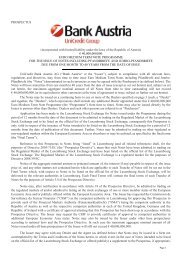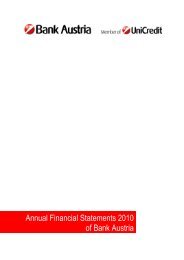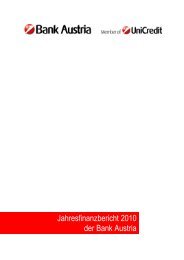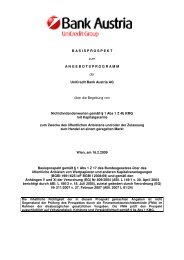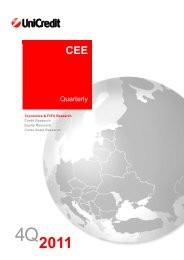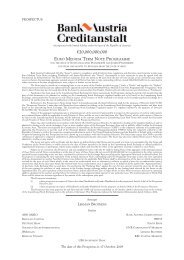Annual Financial Statements 2011 of Bank Austria
Annual Financial Statements 2011 of Bank Austria
Annual Financial Statements 2011 of Bank Austria
Create successful ePaper yourself
Turn your PDF publications into a flip-book with our unique Google optimized e-Paper software.
Management Report <strong>of</strong> UniCredit <strong>Bank</strong> <strong>Austria</strong> AG<br />
In our base scenario we assume that the impact <strong>of</strong> the debt crisis,<br />
at least the volatility and the unpredictable elements, will ease: the<br />
external financing needs <strong>of</strong> the CEE countries – and thus<br />
vulnerability to external shocks – are today lower than they were<br />
many years ago. Moreover, vulnerable countries can count on IMF<br />
and EU support. And we do not expect that foreign banks will<br />
withdraw capital in response to pressure to adjust to the new rules<br />
concerning capital requirements. In the medium to long term, the<br />
CEE banking sector still has the potential to achieve growth in<br />
terms <strong>of</strong> turnover and income at a level above the EU average in<br />
view <strong>of</strong> the market penetration gap which still exists in the area <strong>of</strong><br />
financial services. For example, lending volume as a percentage <strong>of</strong><br />
GDP is estimated at 49% in CEE, compared with 120% in the euro<br />
area.<br />
One <strong>of</strong> the major risk factors in the banking environment in <strong>2011</strong><br />
was the European government debt crisis, with Greece at the<br />
centre <strong>of</strong> the crisis and the credit ratings <strong>of</strong> other highly indebted<br />
countries deteriorating. Significant progress was made in<br />
overcoming the debt crisis towards the end <strong>of</strong> the previous year<br />
and in 2012 to date; as a result, apart from Greece itself, the<br />
situation has eased. On 21 February 2012, representatives <strong>of</strong> the<br />
Eurogroup, the EU and the European Central <strong>Bank</strong> reached<br />
agreement with Greece on a second support package with private<br />
sector involvement (PSI). Under the agreement, the Eurogroup is<br />
prepared to provide additional funds <strong>of</strong> up to € 130 bn (by the end<br />
<strong>of</strong> 2014). The bulk <strong>of</strong> the immediate financing requirements is<br />
accounted for by a recapitalisation <strong>of</strong> the Greek banking sector (€<br />
50 bn) and an EFSF guarantee facility (€ 30 bn) for the remaining<br />
claims <strong>of</strong> the private sector after PSI. Private investors, primarily<br />
international banks, have agreed to a debt restructuring package<br />
under which the present value loss arising from the debt<br />
restructuring amounts to about 75%. Implementation <strong>of</strong> the overall<br />
package still involves risks; for example, one cannot rule out the<br />
possibility that the Greek government will apply Collective Action<br />
Clauses, triggering a “credit event”. But even if the implementation<br />
<strong>of</strong> the package for Greece suffers a further setback, the European<br />
Union, the Eurogroup and the European Central <strong>Bank</strong> are<br />
determined not to let the situation repeat itself, and their<br />
determination enjoys credibility. All European decision-making<br />
bodies see the case <strong>of</strong> Greece, and private sector involvement in<br />
particular, as a singular event.<br />
This has also reduced the risk <strong>of</strong> contagion. Spain (and Portugal) is<br />
negotiating with EU authorities with the objective <strong>of</strong> deferring the<br />
agreed consolidation targets in order not to deepen recession.<br />
Interest rates on recent bond issues <strong>of</strong> Spain were significantly<br />
lower. Portugal will not be able to access capital markets for some<br />
time to come, but the country can count on support from the IMF<br />
and the EU. Italy is a large and competitive economy playing in a<br />
different league. Italy’s main problem is the legacy burden <strong>of</strong> public<br />
debt amounting to 119% <strong>of</strong> GDP, which has been rolled over at this<br />
level without any problems for over fifteen years. In <strong>2011</strong>, Italy<br />
achieved a primary surplus <strong>of</strong> over 1% and its government intends<br />
to strongly increase the primary surplus by achieving a balanced<br />
budget in nominal terms by 2013. Interest rate spreads on Italian<br />
bonds declined significantly in the current year. Risk premiums on<br />
bonds issued by Hungary (see introductory section) also declined<br />
recently, though the downward trend was not as pronounced as in<br />
the case <strong>of</strong> Italy. Although pressure is easing, we expect that<br />
Hungary will resume negotiations with the IMF and the EU.<br />
The policy pursued by the European Central <strong>Bank</strong> (ECB) has<br />
provided strong impetus to crisis management in the past few<br />
months. In addition to a more relaxed monetary policy via standard<br />
instruments, the two large-volume three-year tenders made a<br />
significant contribution toward easing the general situation. The<br />
ECB’s outstanding open market operations thus reached a record<br />
level <strong>of</strong> € 1.2 trn, with the surplus liquidity probably resulting in<br />
additional pressure on interest rates.<br />
Outlook for UniCredit <strong>Bank</strong> <strong>Austria</strong> AG’s performance<br />
The outlook for banking business in <strong>Bank</strong> <strong>Austria</strong>’s perimeter <strong>of</strong><br />
operations is determined by expectations <strong>of</strong> low growth in Western<br />
Europe, at a rate which will be just above zero, and <strong>of</strong> more<br />
moderate growth in Central and Eastern Europe, and by the<br />
probability <strong>of</strong> a deflationary rather than inflationary monetary<br />
environment. The foreseeable stricter regulatory requirements are<br />
likely to reduce the credit multiplier. Given the confidence crisis,<br />
and despite ample supplies <strong>of</strong> liquidity by the ECB, the interbank<br />
market is still not operating effectively; this has an impact on<br />
liquidity management and also indirectly affects a number <strong>of</strong> capital<br />
market-related financing instruments. The operating environment<br />
for the banking industry means that volume trends and margins in<br />
the coming year will not enable <strong>Bank</strong> <strong>Austria</strong> to generate a level <strong>of</strong><br />
annual revenue growth which was quite normal in the years before<br />
2009; growth will be moderate, in line with the overall market.<br />
However, after the substantial one-<strong>of</strong>f charges absorbed in <strong>2011</strong>,<br />
we expect that the bank’s strong operating performance will again<br />
feed through to bottom-line pr<strong>of</strong>its to a larger extent.<br />
� The objective <strong>of</strong> our multi-year plan is to make the bank’s<br />
performance sustainable in this scenario <strong>of</strong> what is widely<br />
referred to as “the new normal”. These are the basic pillars <strong>of</strong><br />
the plan: targeted employment <strong>of</strong> capital, pursuing a focused<br />
growth strategy in CEE, simplifying our organisational set-up and<br />
processes, and maintaining strict cost management. <strong>Bank</strong><br />
<strong>Austria</strong>’s strong equity capital base enables the bank to pursue<br />
further growth and will exclusively support commercial banking<br />
business with customers. We will give close attention in <strong>Austria</strong><br />
to risk-adjusted capital efficiency down to the level <strong>of</strong> individual<br />
transactions. Capital allocation provides CEE, one <strong>of</strong> the few<br />
growth regions, with a sound base for further expansion. In<br />
pursuing expansion, we will focus on countries which are ahead<br />
in terms <strong>of</strong> revenue/risk considerations as well as market size<br />
and growth, and where we hold strong market positions: these<br />
countries are Turkey, Russia and the Czech Republic. In the<br />
other countries we will pragmatically focus our business portfolio<br />
on a case-by-case basis. We seek to achieve a sound balance<br />
<strong>of</strong> local credit expansion and local deposit growth in all<br />
countries.<br />
All this does not change our determination to operate as a<br />
European bank throughout Central and Eastern Europe. Despite<br />
regional divergence and structural differences, the growth<br />
potential <strong>of</strong> the banking sector in CEE countries remains intact.<br />
This is based on the economic catching-up process and the<br />
accelerated monetary cycle, and also on convergence in terms<br />
<strong>of</strong> wages, standard <strong>of</strong> living and consumer habits. The latter<br />
factors hold out the prospect <strong>of</strong> gradually closing the gap in the<br />
supply <strong>of</strong> modern banking products and services. Various cost<br />
reduction programmes are under way to enhance cost efficiency<br />
by redimensioning head <strong>of</strong>fices after the numerous integration<br />
tasks performed in the past years; this process involves the<br />
pooling <strong>of</strong> real estate used by the banks themselves in several<br />
countries. The establishment <strong>of</strong> cross-regional infrastructure for<br />
transaction settlement, IT and internal services is also <strong>of</strong> great<br />
significance in the long term. A major step forward in this context<br />
was the creation <strong>of</strong> UBIS, with UBIS <strong>Austria</strong> as one <strong>of</strong> its<br />
<strong>Bank</strong> <strong>Austria</strong> – <strong>Annual</strong> <strong>Financial</strong> <strong>Statements</strong> <strong>2011</strong> 206




